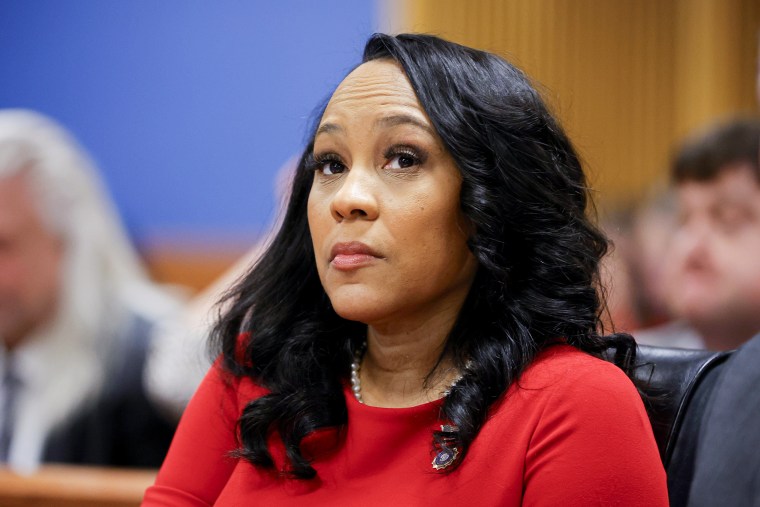In a lengthy hearing before a George Senate committee Wednesday, the defense attorney who first alleged a personal relationship Fulton County District Attorney Fani Willis and special prosecutor Nathan Wade walked lawmakers through how she came to find out about their romance.
The Republican chairman of the Senate Special Committee on Investigations, Bill Cowsert, questioned Ashleigh Merchant, the defense attorney for Michael Roman, a Trump co-defendant who was charged in Fulton County’s election interference case, for several hours. The panel had subpoenaed Merchant for her testimony.
“We’re tasked with investigating and finding the true facts,” Cowsert said, explaining why the committee was holding the hearing. He added that the committee is tasked, if necessary, with amending or creating new statutes “to build guardrails” to “restore the public faith in our criminal justice system.”

The Senate committee does not have any power to disqualify Willis from prosecuting the election interference case. It was the first in what is expected to be a series of hearings investigating Willis for the potential misuse of state funds or power for personal gain.
Merchant reiterated that she wants Willis to be disqualified, alleging a conflict of interest as a result of Willis’ and Wade’s relationship, which they recently said in court had ended last summer. Merchant specifically argued that Willis should not have hired Wade as a special prosecutor in the election interference case, claiming it violated county policy on nepotism and relationships. And she again alleged that Willis benefited from the appointment by accepting trips Wade paid for.
Merchant alleges that their romantic relationship began before Willis appointed him as a special prosecutor in November 2021. The former couple, however, have denied that accusation and have said it began in early 2022.
Merchant testified Wednesday that Wade’s former law partner and former divorce lawyer, Terrence Bradley, first told her that Willis and Wade were in a relationship. She said data she obtained from cellphone pinging showed there were 12,000 voice and text interactions between them in 2021.
Merchant alleged that Willis had received extra funding for homicides and Covid backlogs but used at least part of that funding on the election case, instead. She claimed that Willis hired Wade in such a way as to avoid oversight and then paid him more than other, more experienced special prosecutors.
She also said that Wade had offered her client, Roman, a plea offer of a $5,000 fine and a misdemeanor but that they did not accept it.
The only other lawmaker who questioned Merchant on Wednesday was Democratic Sen. Harold V. Jones II. He expressed skepticism about Merchant’s argument for disqualifying Willis, saying that case she cited in a court motion contradicted points she made Wednesday.
Jones said the court said in that case, “What you have to show is there’s an actual unfairness to the defendant in the trial,” referring to Roman. “Can you point to any unfairness in the trial that’s taken place?”
Merchant rejected the question and said her argument is that there is a conflict of interest because Willis and Wade were “sleeping together, and he was paying for trips for them to go on, and they were hiding it from the taxpayers.”
Speaking to reporters at the Capitol building Wednesday, Willis called the committee hearing a "political quest."
"People are angry because I’m going to do the right thing and stand up for justice. ... They can continue their games, and I’ll continue to do the work of the people," she said.
Asked whether she would appear before the committee if called, Willis said she would consult with her lawyer.
The subpoena directed Merchant to bring various documents, including the history of her texts with Bradley.
While the panel has subpoena power, it does not have the authority to discipline Willis. If its members find wrongdoing, they could either refer the case to proper governing authorities, including a newly approved prosecutor oversight panel, or recommend new laws.
Cowsert said that the investigation will take “many months” to complete and that there will be more subpoenas.
Asked specifically about a subpoena of Willis, Cowsert said, “I don’t know yet.”
The judge overseeing the election interference case, Scott McAfee, recently heard testimony from Willis and Wade and other witnesses as part of the effort to disqualify Willis from prosecuting the case. McAfee said Friday that he would decide within two weeks.

